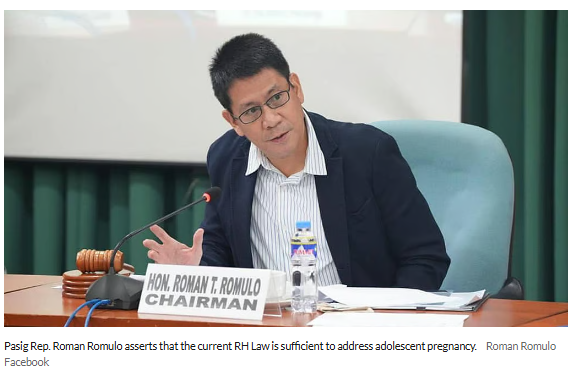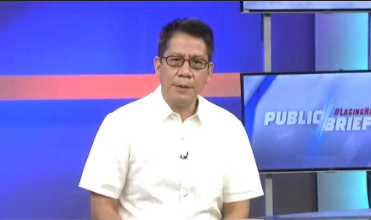Politics & Government
'RH Law sufficient to address adolescent pregnancy' - Pasig Rep. Romulo

Contrary to the conviction of the proponents of the proposed “Prevention of Adolescent Pregnancy Act,” a House leader on Wednesday argued that the controversial bill, providing Comprehensive Sexual Education (CSE), is not the ultimate solution for unwanted teenage pregnancy.

In an interview, Pasig Rep. Roman Romulo, the chairperson of the House Committee on Basic Education and Culture, said he concurs with the position of Health Secretary Teodoro Herbosa that the existing Responsible Parenthood and Reproductive Health Law (Republic Act 10354) is already sufficient to address the rising incidence of adolescent pregnancies.
“The fallacy of the CSE being the answer to adolescent pregnancy is not true because the Reproductive Law [is already there]. There is already a mechanism, and it is a law already… It is not CSE,” Romulo stressed.
“I agree with Secretary Herbosa that we don’t need that [CSE] for [adolescent pregnancy] because we already have the RH Law. If one will just [read] Section 14 and the definitions, that already responds directly to that,” the lawmaker added.
The proposed “Prevention of Adolescent Pregnancy Act” or the Senate Bill (SB) 1979 has stirred up controversy and has met strong opposition from conservative groups and lawmakers who took issue with its so-called problematic provision implementing CSE at all levels in both private and public schools in order to normalize discussion about adolescent sexuality and reproductive health.
The sole purpose: equip adolescents with the “knowledge, skills, and values to make informed and responsible choices about their sexual and social relationships.”
Romulo, however, contended that these objectives of the CSE were already provided under Section 14 of the RH Law.
Roman is one with his co-legislators in raising serious concerns about the contentious CSE, which has already been implemented by the DepEd since 2018 under its Department Order (DO) 31, notwithstanding the absence of an enabling law.
The CSE concepts are being taught to students as early as Kindergarten to Grade 3.
“Comprehensive Sexuality Education encompasses a wide range of topics far beyond what was authorized in the Reproductive Health Law… I’m not saying CSE should not be taught, but it should not be just put in without any discussion,” he averred.
The DepEd, Romulo asserted, was at fault for simply inserting CSE in the DO 31 without having a thorough public discussion on the matter, considering that its concepts include terms that are broad and sensitive.
“The point is it must be discussed publicly; all sectors must be heard. At this point, in Department Order 31, suddenly, this term comes out. They are normalizing terms, which I think must be publicly known, debated, and discussed,” he said.
“If you sincerely believe that it must be discussed, then it must be discussed publicly with policymakers, parents, and with interested groups. It must pass the test that [the] public accepts it,” he continued.
DepEd Secretary Juan Edgardo “Sonny” Angara said the DepEd can temporarily — but not permanently — suspend the CSE's implementation to tweak certain flaws pointed out by the legislators.
Angara also vowed that the DepEd would find “more neutral terms and ensure age-appropriate concepts” in CSE, acknowledging the hazards of it to Kindergarten and Grade 3 students.
Earlier, President Ferdinand Marcos Jr. warned that he would use his veto power to block SB 1979, which he described as “abhorrent” and contains “woke” ideologies that were inappropriate for children.
SB 1979 is the counterpart measure of House Bill (HB) 8910, passed by the lower chamber in September 2023. Both measures seek to prevent adolescent pregnancies, with some cases involving girls as young as 10 years old.
Some House lawmakers have petitioned to recall HB 8910 to the committee level, citing its potential implications to the existing laws such as the Family Code.
The House’s version of the bill contains a provision that if the minor’s parent or guardian refuses to give consent to give the minor access to health services, the latter can obtain it from a duly licensed and trained health service provider, which lawmakers argued will effectively remote parental consent.
According to Romulo, the House bill never passed his committee, but rather the committee on youth sports and development.
Reprinted with permission from the Daily Tribune, photo credit to the PDI


